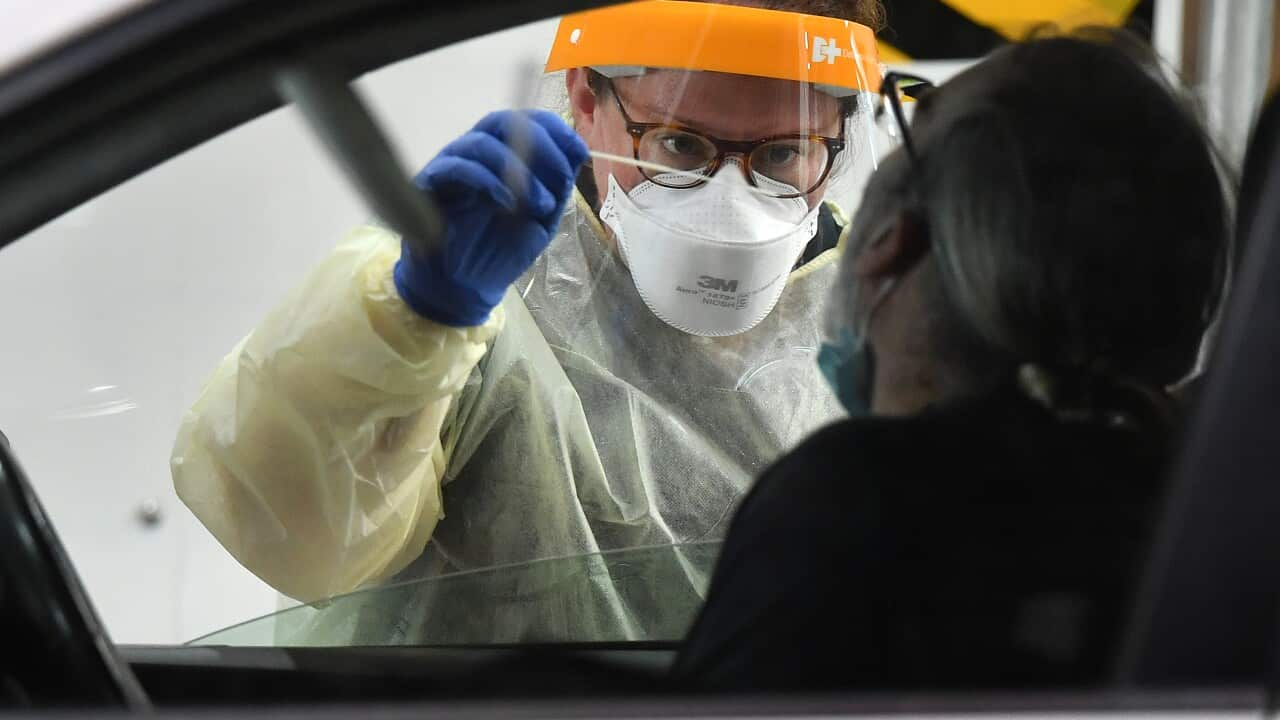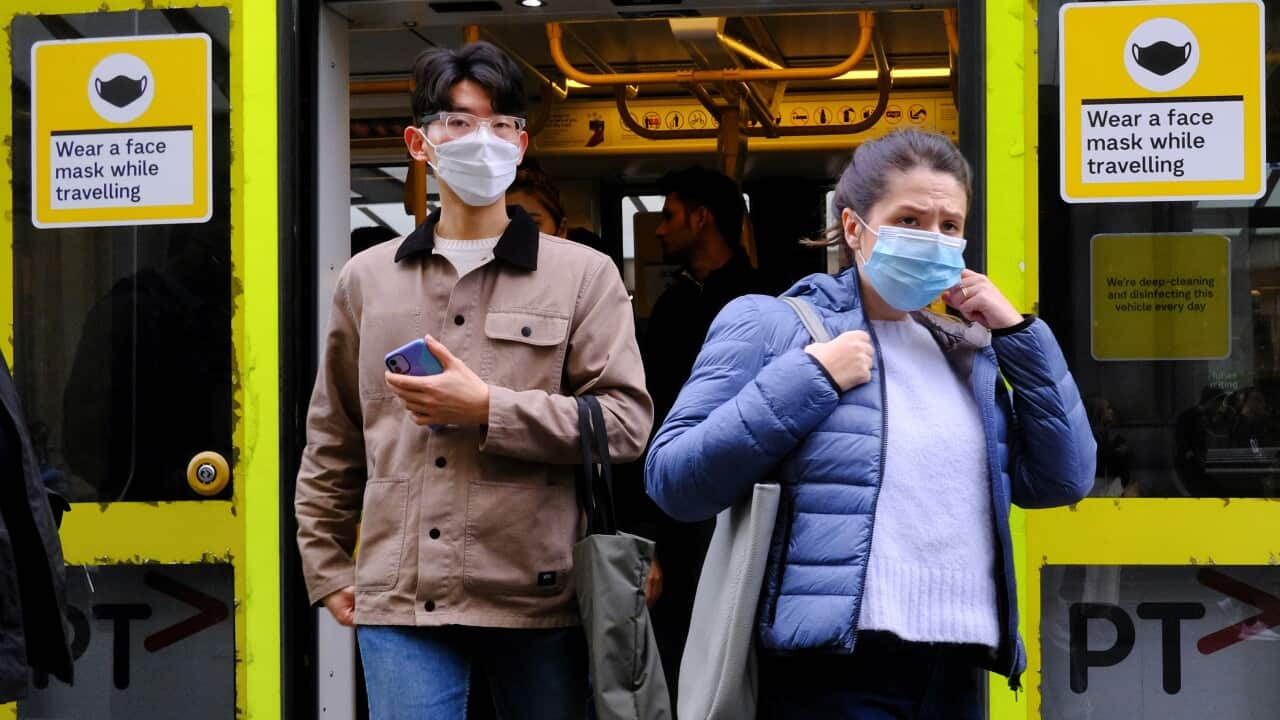Key points
- An Australian couple followed health advice to get a second booster in July but now regret it.
- A fifth COVID-19 vaccine dose still isn't available to most Australians like it is overseas.
Julie* and her husband David* were unsure whether they should get their COVID-19 booster shot in July but decided to follow the Australian health advice to get vaccinated amid a surge in cases in the country and concerns about overrun hospitals.
It was their fourth COVID-19 jab.
Three months later they regret the decision as it may mean they will have to delay an overseas trip in December for Julie to seek health treatment in Europe.
The couple is aged in their 60s and each has health issues. David has congenital heart disease and diabetes, while Julie has some conditions including respiratory problems. Despite this, neither are eligible to get a fifth dose of the COVID-19 vaccine.
In particular, they had been hopeful of getting the new , which targets the original 2020 COVID-19 variant as well as Omicron variant BA.1. The updated vaccine also appears to give some extra protection against subvariants BA.4 and BA.5, the main Omicron variants circulating in Australia.
At the time they got vaccinated in July, the couple were under the impression they would be able to get the Omicron-specific vaccine without any issues once it became available in Australia.
The couple pointed to media reports published at the time including one in July which quoted a Department of Health spokeswoman saying: "Having a fourth dose of the currently available vaccines would not preclude later access to a new vaccine that may offer better protection against transmission and the Omicron strain".

Some Australians are upset they can't get a fifth dose of COVID vaccine. Source: AAP / Dan Himbrechts
As both Julie and David have already had four vaccine doses, they are not able to get a fifth dose. Their health conditions also do not meet the criteria for those who are severely immunocompromised.
Julie said they felt "very angry, very let down and very, very distressed".
"Certainly I would not have had that vaccine because our time overseas has been planned for some time," she said.
Very angry, very let down and very, very distressed.- Julie*
By the time the couple are due to leave for their trip, it will have been five months since they were last vaccinated and they are worried about waning immunity. Julie says she would have delayed getting the booster earlier this year if she had known. The couple are now unsure whether to delay their departure.
A Health Department spokesperson told SBS News that the advice given in July was correct.
"Getting a fourth vaccine dose in July does not preclude you from having a bivalent as a subsequent recommended dose, if recommended by ATAGI [Australian Technical Advisory Group on Immunisation]," they said.
"At this stage, ATAGI has not made recommendations for additional doses after the fourth one (or five for severely immunocompromised individual, for whom a primary course is three doses)."
Julie has known she would need to travel overseas for treatment since 2019 but her plans were delayed due to the pandemic. Believing that she would be able to get the Omicron-specific vaccine later this year, she started booking accommodation for a trip in late December.
Her plans were thrown into disarray after her GP told her in October she might not be eligible for the booster. Part of the frustration has been the inability for her doctor to assess her individual circumstances and make a decision based on her personal situation.
David, who is also a doctor, said he found it extraordinary that almost three years into the pandemic there is not more flexibility for the circumstances of individual patients.
"You would think at this point, guidelines would operate as guidelines and individual doctors would have some ability to adjust the treatment, according to a patient's circumstances, but there's no provision for that at all," he said.
He said there were guidelines in every area of medicine but it was possible to depart from these guidelines at the discretion of the health practitioner or through a specific process.

The couple believe doctors should be able to administer an extra vaccine dose based on an individual's personal circumstances Source: Shutterstock
A department spokesperson said: "Recommendations made by ATAGI regarding eligibility for doses are made following a thorough assessment of safety, efficacy and complex epidemiological considerations. Consistent with all other Australian vaccination programs, practitioners are expected to follow the clinical guidelines provided to support the safe and effective use of vaccines for their patients."
Why can't people get a fifth dose if they want one?
Other countries, including the United States and Singapore, have recommended residents get a fifth booster dose of the bivalent vaccine. Americans even have access to a more advanced version of the vaccine, which targets the BA.4 and BA.5 variants.
Clinical epidemiologist Professor Nancy Baxter of the University of Melbourne said she didn't think Australian authorities would follow the US and offer it to everyone.
"I think part of the thinking that's gone into it in the US is they're going into winter, so they expect the [COVID-19] surge to be higher," she said.
Professor Baxter said the US had also not experienced a bad BA.5 wave, like Australia had, so they could be expecting a worse outbreak. Another factor in Australia's favour is that it has a highly vaccinated population, even though booster take-up has not been as good as for the first two doses.
She believes authorities will open up eligibility for a fifth dose if there is a significant surge in cases.
"If the next wave starts to look like it's really gaining momentum, almost certainly they'll allow the fifth dose or the fourth dose for people," she said.

Professor Nancy Baxter says there are many reasons why Australian authorities don't want to open up eligibility for a fifth vaccine dose. Source: Supplied
"If we have a minor wavelet, and we get people vaccinated during this minor wavelet, when we get to a real surge, we won't have the ability to vaccinate them then because they've already been vaccinated."
Professor Baxter said she understood people wanted to be as vaccinated as possible, adding: "I feel like that as well".
But she said from a healthcare system perspective, vaccinating people every four months was not a sustainable strategy unless there was a clear and apparent need.
"Mainly the focus now is those that are at higher risk," she said.
Should I be worried I can't get the new Omicron-specific vaccine?
Professor Baxter said another complicating factor was that it was unclear whether the new bivalent vaccine was a lot more effective than the older vaccines.
"The studies have been somewhat inconsistent, some showing that there's increased response, and some showing, not really, in real life," she said.
"It's not 100 per cent clear that it's a game-changer, certainly it doesn't make as much difference as just getting the booster of any sort."

It's unclear whether Moderna's new Omicron specific bivalent vaccine provides significant extra protection compared to older vaccines. Source: AP / K.M. Chaudary
What if I'm worried about the effectiveness of my booster wearing off?
Professor Baxter said the protective effect of boosters against hospitalisation and death began to wane by small percentages, starting around four months after being administered, although it still provides good protection quite a long time after vaccination.
For someone who had a third vaccine dose (or first booster) in December, January or February, it would now be around 11 months since they were boosted.
"Their protection against getting COVID has waned long ago, but their protection against hospitalisation and death, it's still holding up but it's waning a little bit," she said.
"Likely another booster would be helpful, particularly as we're facing another surge so I would anticipate that they're going to be at some point, opening up another dose to people."
In terms of the new variants circulating, Professor Baxter said the good news was that they didn't seem to be causing more severe illness and death.
She said many Australians seemed to want to move on from the pandemic and there was no longer as much concern about people who were at higher risk so it was really up to them to protect themselves.
As well as being up-to-date with vaccines, she recommended that people who were concerned should continue to wear quality masks, such as P2 or N95 masks, think about ventilation in their indoor spaces and try to be outdoors as much as possible.
Professor Baxter also urged people to speak to their doctors about whether they're eligible for anti-virals and how they would access these if they did get infected with COVID-19.
"There's a lot of COVID out there right now," she said. "I think taking precautions even though you're swimming upstream is important."
*Names have been changed.
Would you like to share your story with SBS News? Email [email protected]














